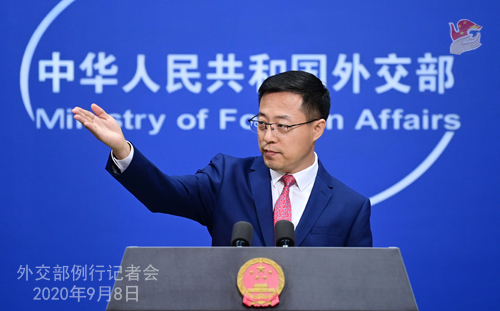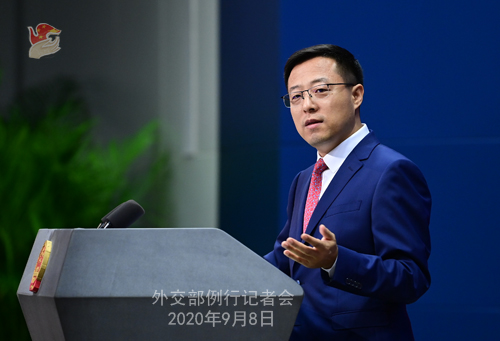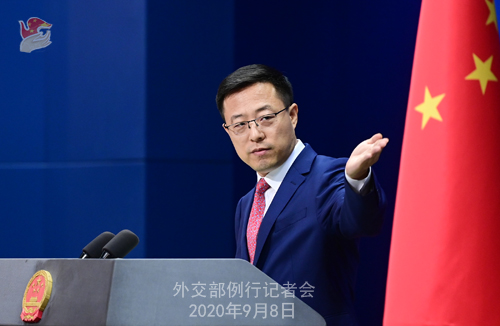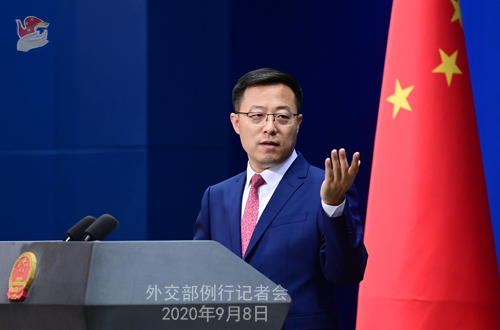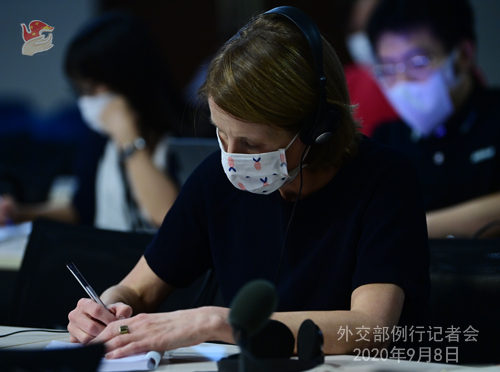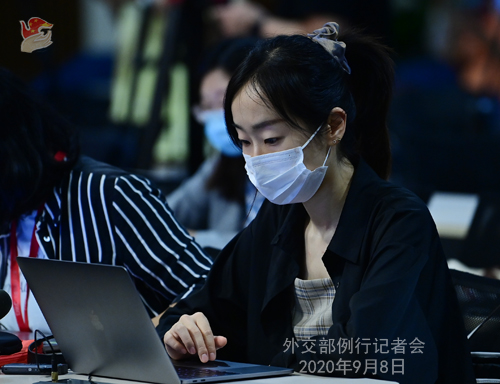| Foreign Ministry Spokesperson Zhao Lijian's Regular Press Conference on September 8, 2020 |
| 2020-09-08 22:47 |
|
1. The Foreign Ministers' meetings on East Asia cooperation will be held via video link from September 9 to 12. At the invitation of Deputy Prime Minister and Foreign Minister Pham Binh Minh of Vietnam, the Chair of ASEAN for 2020, State Councilor and Foreign Minister Wang Yi will attend relevant meetings on September 9. 2. State Councilor and Foreign Minister Wang Yi delivered via video-link a keynote speech at the International Seminar on Global Digital Governance under the theme "Seizing Digital Opportunities for Cooperation and Development" held in Beijing this morning and put forward a Global Initiative on Data Security. This initiative by China calls for the following: States should maintain global supply chains open, secure and stable; stand against ICT activities that impair or steal important data of other States' critical infrastructure; prevent and put an end to activities that jeopardize personal information through the use of ICTs; oppose mass surveillance against other States with ICTs as a tool; not request domestic companies to store data generated and obtained overseas in their own territory; not obtain data located in other States through companies; and ICT products and services providers should not install backdoors in their products and services. You can find the Chinese and English transcripts of State Councilor Wang's speech and the Initiative on the MFA website. As a new round of technological revolution and industrial transformation is in the making, the mounting risks of data security have posed new challenges to global digital governance. In this context, China has put forward the initiative with the aim of safeguarding global data and supply chain security, promoting development of the digital economy, and providing a basis for international rules-making in this area. The initiative is also China's commitment to protecting global data security. We call on national governments, companies and all other stakeholders to support the Chinese initiative and shoulder their global responsibilities in a digital era for win-win cooperation and shared development. CCTV: You just announced that State Councilor and Foreign Minister Wang Yi will attend the foreign ministers' meetings on East Asia cooperation. What is China's view of the current China-ASEAN relations? What is China's expectation for this upcoming event? Zhao Lijian: China-ASEAN relationship is more dynamic and has more connotations than any other relations ASEAN has with its dialogue partners. With the concerted efforts from both sides, China-ASEAN relationship has entered a new stage of all-dimensional development. Since COVID-19 broke out this year, we have joined hands to fight the virus, stabilize economy and ensure people's well-being and add more dimensions to our strategic partnership. In the first half of this year, China-ASEAN trade and investment cooperation has grown despite the pandemic, making ASEAN the biggest trading partner of China for the first time and demonstrating the huge potential and strong resilience of bilateral cooperation. China will take the 30th anniversary of China-ASEAN dialogue partnership next year as an opportunity to better plan for and advance practical cooperation with ASEAN and elevate bilateral relations to new heights. As the pandemic is still wreaking havoc in this region and around the globe, all countries face the challenges of epidemic control and economic recovery. China hopes that the foreign ministers' meetings on East Asia cooperation this time will focus on solidarity against COVID-19 and common development, proceed from the current situation while looking into the future, further consolidate the outcomes of epidemic control in this region, promote economic recovery in a post-COVID era, so as to inject new impetus into the stability and development of East Asia and build on outcomes for the East Asian leaders' meetings on cooperation at the end of this year. The Paper: Did China come up with the Global Initiative on Data Security to counter the US Clean Network program? Zhao Lijian: Global digital governance calls for countries to build mutual trust and deepen cooperation. As State Councilor Wang Yi points out in this morning's speech, pursuing extensive consultation and joint contribution for shared benefits is the right way forward for addressing issues in global digital governance. By putting forward this initiative, China hopes to contribute ideas for protecting data security, growing the digital economy and advancing global digital governance. We stand ready to work with other parties to uphold multilateralism, balance security and development, ensure fairness and justice, and jointly deal with new challenges and build a community with a shared future in the digital world. I would like to stress that China is always candid, open and ready to work together with others on data security. If other countries, especially those who have been deliberately smearing China with lies and groundless allegations, can make the same commitment, it will be greatly conducive to enhancing mutual trust and cooperation on the issue of data security.
AFP: The French President Macron made some comments on the treatment of Uyghurs in Xinjiang. It was in a reply letter to MPs. It says that what China is doing there is unacceptable. He also said that France is strongly opposed to it. Are you aware of this comment and, if yes, are you in contact with the French side on this issue? Zhao Lijian: Xinjiang follows China's state policy on ethnic groups in full accordance with law, and all ethnic groups in Xinjiang are equal. There has never been such a thing as "reeducation camp" in Xinjiang. The education and vocational training centers in Xinjiang as well as other counter-terrorism and de-radicalization measures taken there have led to positive outcomes, making important contributions to the global fight against terrorism and radicalization. Since the end of 2018, nearly a thousand visitors from more than 90 countries, including France, have visited Xinjiang, seeing for themselves the ethnic unity, social stability and prosperity unfolding in the land of the Xinjiang Uyghur Autonomous Region. I want to stress that the issues that have been hyped up about Xinjiang are never about human rights, religion and ethnicity. There are about fighting against violence, terrorism and separatism. The relevant side should respect facts and view what's happened in Xinjiang in an objective and unbiased way. China News Review: The US government has announced the ban on the operation of Chinese businesses including TikTok and fully excluded Huawei's 5G technology citing possible threats to data security. So, does China launch this Global Initiative on Data Security out of the considerations for protecting Chinese companies operating overseas? Will this initiative address the US side's concerns over Chinese companies in the field of data security? Zhao Lijian: Data security risk is the common challenge faced by all countries when developing digital economy. As I just said, the purpose and goal of this Initiative is to address this challenge and advance cooperation on digital economy for common development. The Initiative is aimed to provide a blueprint for formulating global standards, find a path of mutual respect and shared governance for addressing the challenge of digital security and build a more dynamic community with a shared future in cyberspace. As State Councilor Wang Yi stressed in his remarks, to address risks and challenges on this front, we should uphold multilateralism, strike a balance between security and development and adhere to fairness and justice. With these principles, all parties should base their opinions on facts, specify problems and put proposals on the table and discuss in a frank and above-board manner. The politicization of the data issue with double standards to smear and oppress foreign businesses is detrimental to others and oneself, which will severely disrupt and obstruct the efforts on global digital cooperation and development. Xinhua News Agency: Dr. Bruce Aylward, senior advisor to the WHO director-general, congratulated China on its success in putting the COVID-19 epidemic under control at a press conference. He called on the the rest of the world to learn from China the three aspects the success can be attributed to, namely investment at the state level in the public health infrastructure, the sense of individual responsibility among the Chinese people, and the incredible effort to build additional capacity and preparedness even when infection was heading down. Do you have any comment on this? Zhao Lijian: In the face of the COVID-19 pandemic, the Communist Party of China (CPC) has united and led 1.4 billion Chinese people in a most courageous fight against the virus, and achieved major strategic outcomes. This fully manifests the CPC's role as the strong leadership and the most reliable backbone and demonstrates the remarkable advantages of China's national system and governance system, the great strength of the Chinese people and nation, and the profound heritage of the Chinese civilization. It also displays China's sense of responsibility as a responsible major country. In his important speech delivered at the meeting to commend role models in China's fight against the COVID-19 epidemic this morning, President Xi Jinping summarized and explained China's spirit of combating the COVID-19 epidemic, which features putting people's lives first, nationwide solidarity, heroic self-sacrifice, respecting science, and a sense of mission for humanity. This spirit will not only run through the whole process of China's fight against COVID-19, but will also become a powerful force for building a modern socialist country in all respects and realizing the great rejuvenation of the Chinese nation. During the Chinese people's fight against COVID-19, the international community including the WHO provided valuable support to China in various ways. At the same time, despite great pressure from epidemic control, China has provided assistance to the international community to the best of its ability, worked with other countries to overcome the difficulties, and helped save the lives of tens of thousands of people around the world with concrete actions. This demonstrates China's sincere desire to build a community with a shared future for mankind. As President Xi Jinping has pointed out, no country can be immune from a major crisis, and solidarity and cooperation are the right way forward. Any country's selfish acts to shift blame and confuse right and wrong will harm not only itself and its own people, but also people all over the world. At present, the epidemic is still raging around the world. Upholding the vision of a community with a shared future for mankind, China will continue to advance international cooperation on epidemic control, support the WHO in playing a leading role in the global fight against COVID-19, and share experience in epidemic control and treatment with other countries. It will continue to provide assistance to countries and regions that have fragile health systems to jointly win this war for global public health.
Reuters: The Australian embassy and two Australian news bureaus have arranged two Australian journalists to leave China over what they say a serious concern regarding their security in the country. The two journalists said they were questioned by relevant departments in China as part of a national security investigation. What's the ministry's comment on this? Zhao Lijian: The relevant departments in China, during their investigation of a case, questioned the two journalists in accordance with law. These were normal law enforcement activities. During the entire process, the Chinese departments conducted themselves in strict accordance with law. I also want to stress that China's basic state policy of opening up has not changed and will not change. China always welcomes foreign journalists, including those employed by the Chinese media, to report and work in China in accordance with laws and regulations, and has always provided and will continue to provide convenience and assistance to this end. China protects the legitimate rights and interests of news reporters and editors in accordance with the law, but journalists are also obliged to abide by Chinese laws and regulations. As long as foreign journalists abide by the law and report according to regulations, there is no need for them to have any worries. Global Times: Has the Chinese side held consultations with other countries before proposing this Global Initiative on Data Security? What will come next? Zhao Lijian: It is a realistic need for all parties to enhance global cooperation and governance on data security. More than 100 countries have rolled out data protection laws and regulations, covering every aspect of data security and serving as a good foundation for global governance in this area. It is therefore timely and relevant to formulate global rules for data security. In recent years, China has taken a constructive part in multilateral and regional discussions on data security including at the UN, G20, BRICS and the ASEAN Regional Forum. One observation from that is the urgent need for countries to improve communication, coordination and global governance on data security. In light of this, China put forward the Global Initiative on Data Security with the view of contributing Chinese wisdom to international rules-making in this area. We hope it will get broad support. We will be open-minded to good suggestions from all sides and work jointly for meaningful exchange at multilateral and regional platforms like the UN and G20 to come up with a set of global rules that reflect the will of all countries and respect the interests of all parties. Beijing Youth Daily: US Assistant Secretary David Stilwell said recently that one especially urgent challenge to ASEAN is China's manipulation of the Mekong River flows for its own profit at great cost to downstream nations. He cited a report claiming that "China has been manipulating the water flows along the Mekong for 25 years, with the greatest disruption in natural flows coinciding with major dam construction and operation". He also said that the US is working with Mekong countries, the Mekong River Commission and international partners to ensure calls for water data transparency from China are answered. What is your response? Zhao Lijian: Since last year, the US has been hyping up the issue of Mekong water resources in an attempt to create a hotspot, sow discord between regional countries, and sabotage the atmosphere for Lancang-Mekong cooperation. This is nothing new. I would like to stress the following: First, we should have a science-based view on the functions of hydrological facilities. Experts have found that after China's cascade reservoirs were put into use, dry-season flows of relevant sections increased by 20 percent compared to past natural levels. The latest report by the Mekong River Commission (MRC) released in August also acknowledged the reservoirs' function to store water in the flood season for later use in the dry season, which helps maintain the steady flow of the Mekong. On the whole, the hydro-power facilities in China plays a beneficial role for Mekong countries. Second, we should stick to facts when looking back on China's tremendous efforts in Lancang-Mekong water resources cooperation over the past many years. For 18 years in a row, China has been providing flood-season hydrological data for free to the MRC and lower-stream countries and helping them formulate plans for flood prevention and drought mitigation. Since the Lancang-Mekong cooperation mechanism was launched, China has sent emergency notifications on major changes in outflow of Jinghong hydro-power plant more than 10 times. At the third LMC leaders' meeting held not long ago, Premier Li Keqiang announced China will share with the Mekong River countries the annual hydrological information of the Lancang River, which will further elevate cooperation in this regard. Third, the report cited by the US side is presumably the study by Eyes on Earth. It alleged that China had impounded 280 billion cubic meters of water. As a matter of fact, the maximum capacity of Chinese reservoirs is only 42 billion cubic meters. A report with such obvious deviation from facts has no scientific value. It has been found to be gravely flawed by many international hydrological experts. I would advise caution to my fellow American diplomats who want to quote its findings. Finally, I would like to say that the Lancang-Mekong River links the six littoral countries' future closely. It is China's belief that as long as we have mutual trust, understanding and support, rise above external disturbances and focus on practical cooperation, we can properly manage our shared resources and promote common and sustainable development to the benefit of all our peoples.
Prasar Bharati: A spokesperson of the Chinese military issued a statement on September 7 regarding an incident in the southern bank of the Pangong Tso. In response to that, the Indian government has also issued a statement saying that China has taken provocative steps, not India, and Chinese troops also fired warning shots. I was just wondering if you have any comment? Zhao Lijian: The Chinese People's Liberation Army (PLA) Western Theater Command spokesperson already released a statement on the incident you mentioned. On September 7, the Indian troops illegally crossed the line into the Shenpao Mountain region on the southern bank of the Pangong Lake in the western sector of the China-India border and blatantly fired shots to threaten the Chinese border patrol personnel who approached them for representations. The Chinese troops had no choice but to take measures in response to stabilize and control the situation on the ground. The Indian side's behavior is a grave violation of relevant bilateral agreements, which heightened tensions and made the situation highly susceptible to misunderstanding and miscalculation. This is a serious military provocation of an egregious nature. We demand that the Indian side immediately stop making dangerous moves, pull back trespassers, strictly discipline frontline troops, hold those who fired the shots in provocation accountable, and make sure such incidents will not be repeated. The Chinese troops will resolutely fulfill their duty and defend China's territorial sovereignty. Prasar Bharati: I've seen this statement you read just now by the spokesperson of the Chinese military. I was wondering what kind of consultations Chinese troops wanted to have with Indian troops? And what kind of countermeasures they have taken to stabilize the situation? Zhao Lijian: The Chinese side has lodged solemn representations with the Indian side through diplomatic and military channels on this. We demand that the Indian side immediately stop making dangerous moves, pull back trespassers, strictly discipline frontline troops, hold those who fired the shots in provocation accountable, and make sure such incidents will not be repeated. Prasar Bharati: There's so much confusion because both India and China have been making similar kind of statement saying things about each other. I just wonder whether the issue of disengagement at the Pangong Tso area came up during defense ministers' talks in Moscow and if they reached agreement there about this as part of their agreement, if any? Zhao Lijian: The Chinese side has already released a readout on the meeting between the Chinese and Indian defense ministers on September 4 in Moscow. I can give you a recap. State Councilor and Minister of National Defense Wei Fenghe said it is very important for the two ministers to hold candid exchange of views face-to-face as relations between the two countries and militaries have been severely affected by border issues. The root and truth of the current tensions is very clear. The Indian side is entirely responsible. Not an inch of China's territory shall be lost. The Chinese military is absolutely determined, capable and confident in safeguarding national sovereignty and territorial integrity. The two sides should faithfully implement the important consensus reached between President Xi Jinping and Prime Minister Modi and stick to dialogue and consultation to resolve relevant issues. We hope that the Indian side will strictly follow the series of agreements inked with China in tightening their control over the front-line troops and make sure they make no provocation by trespassing across the LAC, taking no action that may stoke tension, and refrain from hyping up and highlighting negativities. Both sides should set eyes on the big picture of China-India relations and regional peace and stability. We should work together and pull towards the same direction so as to cool down the situation as soon as possible and uphold peace and tranquility in the border areas. Indian Defense Minister Singh said that peace and stability in the border areas is of critical importance to the bilateral relationship, considering the current situation. The two sides should keep dialogues at all levels going, including through military and diplomatic channels, and strive to peacefully resolve the relevant issues through dialogue and consultation. The two sides should act responsibly and take measures to fully disengage front-line troops at an early date and avoid further escalating or confounding the situation. Differences shall not be allowed to become disputes and the state-to-state and mil-to-mil relations shall be returned to the right track at an early date. I also want to add that in this incident, it was the Indian side that first opened fire at and threatened the Chinese border patrol personnel. The tranquility of the border areas was for the first time since 1975 pierced through by the gun shots. China has been reiterating that the two sides should seek to resolve issues through peaceful consultation and dialogue. Confrontation doesn't benefit either side.
Reuters: I wanted to ask whether the two Australian journalists are permitted to return to China and will these two Australian news bureaus be able to obtain accreditation in the future? And will the ministry continue to process visas of other Australian journalists? Zhao Lijian: We have no more information to offer at the moment. I would like to repeat that China handles relevant matters regarding foreign media and journalists in China in accordance with laws and regulations. Reuters: The Australian media outlets suggested that their questioning was related to the detention of Cheng Lei, the Australian CGTN journalist. Can the ministry confirm that their questioning was related to Cheng Lei's case? Zhao Lijian: As I just said, the relevant departments in China, during their investigation of a case, questioned the two journalists in accordance with law. These were normal law enforcement activities. The entire process conducted by the Chinese departments is in strict accordance with law. As for the Australian citizen Cheng Lei, her case is still under investigation and in legal process, and her legitimate rights and interests are fully guaranteed. Reuters: Rights group researchers and others outside of China have criticized US entertainment company Disney for cooperating with public security bureaus and other Chinese government organizations in Xinjiang during the making of the film Mulan. They say the police bureau named and other Chinese government organizations are involved in human rights violations. What is the Foreign Ministry's comment? Zhao Lijian: I must point out that the so-called Xinjiang issues are not about ethnicity, religion or human rights, but about fighting violence, terrorism and separatism. There is no so-called "reeducation camps" in Xinjiang. The vocational education and training program is a meaningful exploration in preventive counter-terrorism and deradicalization. It is no different from what many countries do. Xinjiang hasn't seen a single terror incident in the past three years or so. By the end of 2019, all trainees who received courses including standard spoken and written Chinese, understanding of the law, vocational skills, and deradicalization had completed their courses and secured employment. Certain anti-China foreign forces have been smearing and attacking China's Xinjiang policy, and they basically cited a so-called German scholar named Adrian Zenz. The media has repeatedly disclosed that Adrian Zenz is a key member of the Xinjiang Education and Training Center Research Group set up by the US intelligence agency, making a living from fabricating rumors about Xinjiang and slandering China. We hope our media outlets will not be blinded by his remarks. You may also have a look at his Twitter and the so-called report he made, which are fraught with lies.
|
| |||||||||||||||
|
|||||||||||||||


